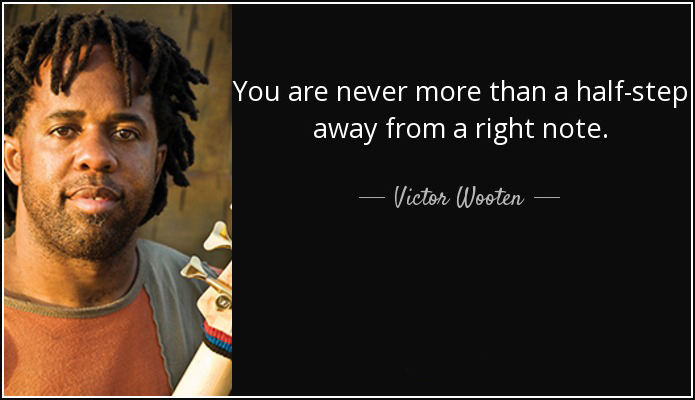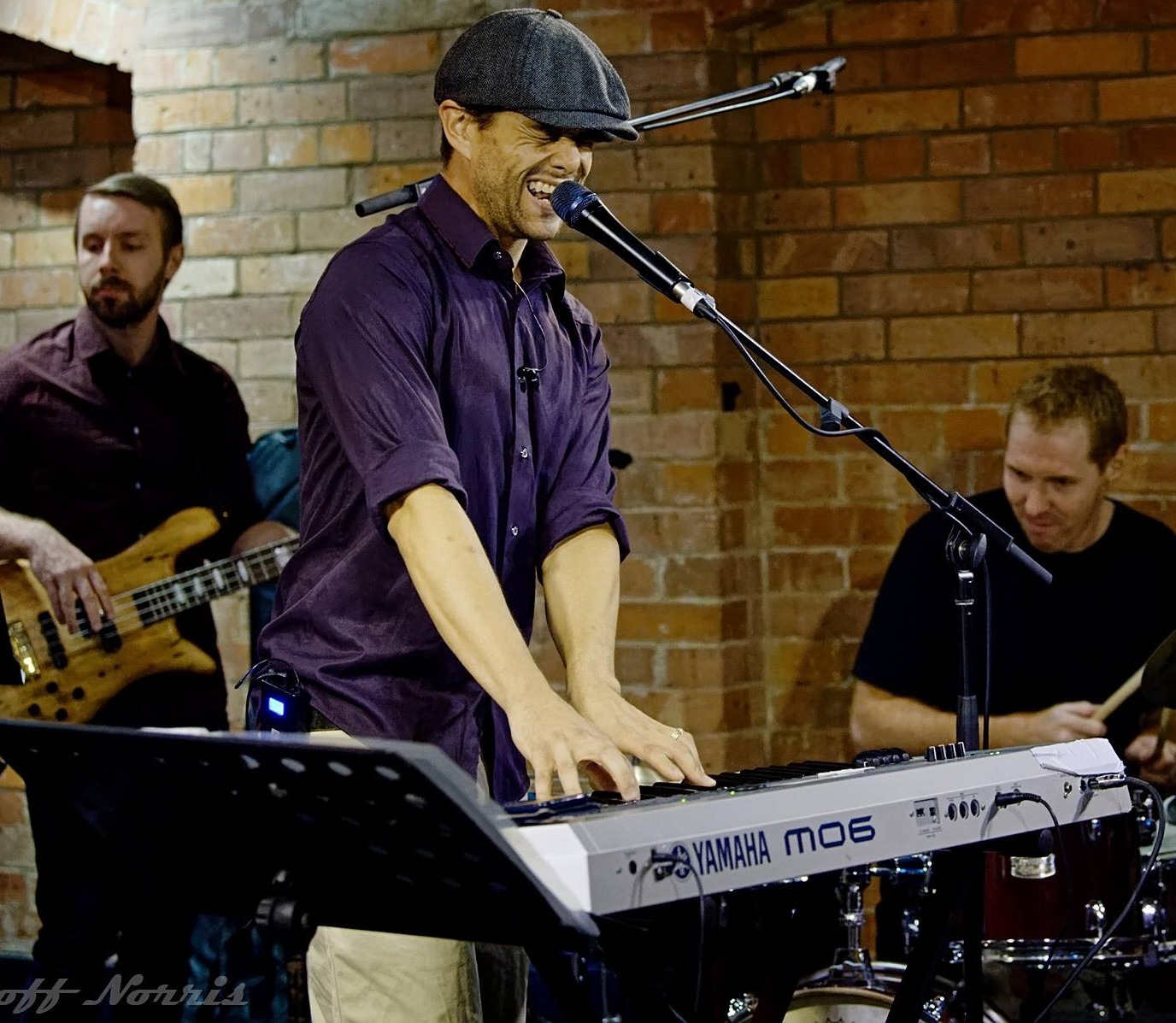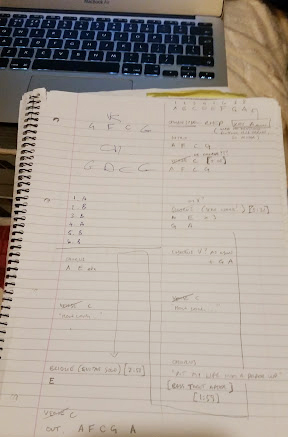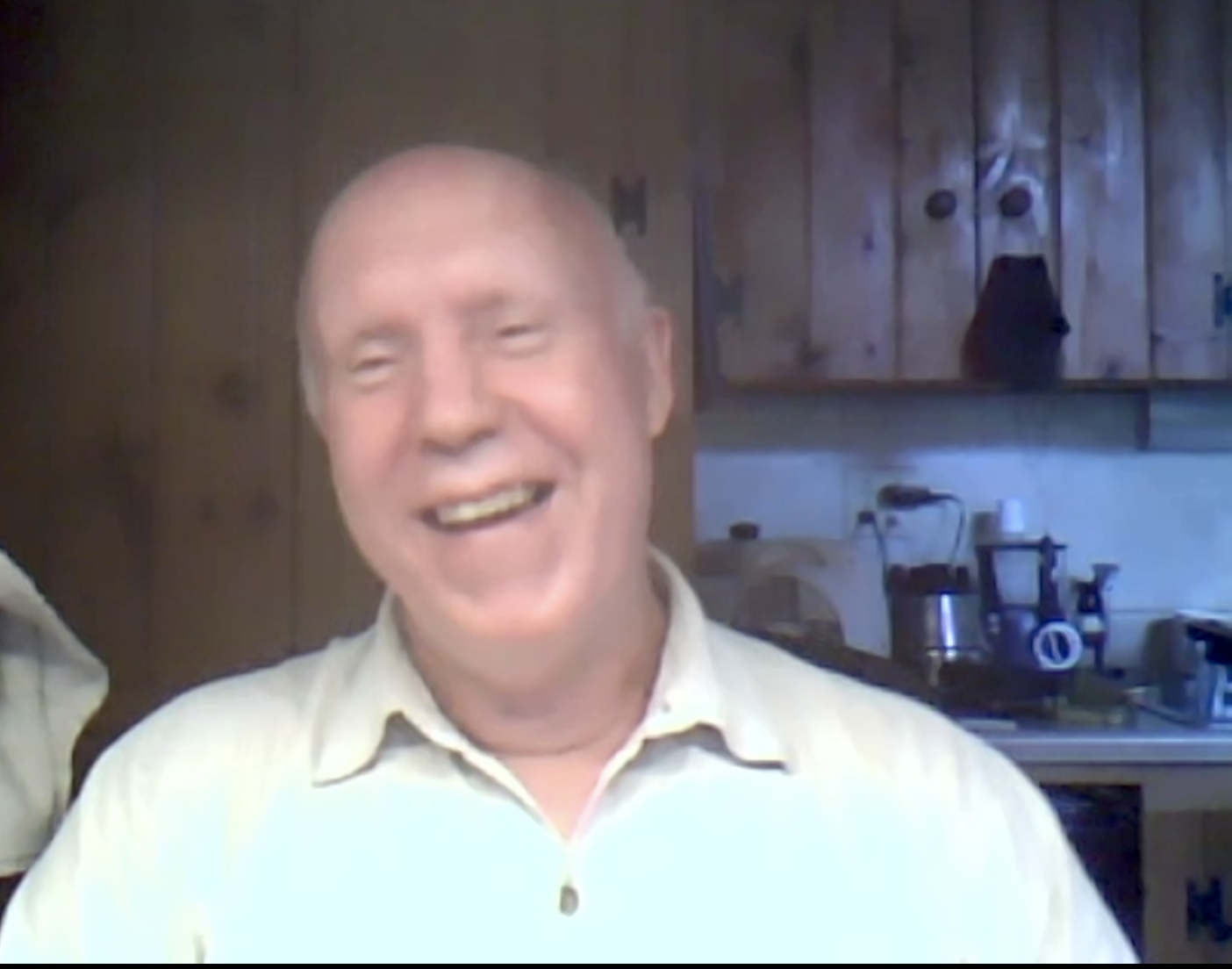“I don’t want to be the weakest link in my band anymore…”
You’re at a jam session, playing some of your favorite songs and having a great time. The songs are flowing, it’s a really cool vibe and there are smiles across everyone’s face.
Tune after tune get called, and you’re all over all of them.
You’re locking in with the drummer, you’re feeling confident - maybe you’re even throwing in a few adventurous fills and licks. You’ve got this!
But then someone throws a spanner in the works. They call a song that you don’t know how to play. In fact, it’s a song you’ve never even heard before.
You don’t want to be the person who says ‘No’ to a song everybody else is eager to play.
So what do you do?
You hold your tongue and look around, waiting for someone else to suggest a different song.
But it never happens.
Instead, the drummer says, “Yeah - let’s do it!” The guitarist is nodding his head, tuning up, getting ready for the count off. Then you finally realize…
You're the only one who doesn't know the song...
You start to panic when it looks like the drummer is about to start playing, so you finally say, “Uh…I don’t know that one - let’s play something else”
You get a blank look from the guitarist, who says,
“Don’t worry - it’s not hard. You’ll be fine.”
You think, “That’s easy for HIM to say - he knows the song!”
In a last-ditch effort to avoid the coming trainwreck, you suggest another song to play instead; one that you DO know.
But your suggestion goes down like a lead balloon. All you see are shaking heads and cries of:
‘THAT song? No way.”
The guitarist, getting agitated, says, “Seriously - you’ll get through it…“
And then he drops this bombshell:
“Just follow me”

Just follow? But what if you can’t just follow someone without knowing the song and practicing it in advance? What if you’ve only ever learned songs from tabs or YouTube tutorials?
You start to get anxious, so you ask, “What key is it in? What are the chords?”
You’re grasping for any scrap of information that will help you get through the song, but the only response?
“You’ll hear it”
That’s not helpful - at all...
Your heart starts pumping faster and harder. You don’t realize it, but your breathing stops momentarily. Beads of sweat start forming on your forehead. Your palms start getting clammy as the drummer prepares to count off the song.
You know you’re not ready for this, but all of a sudden, you’re being thrown in the deep end.
It’s sink or swim, and you’re about to sink.
The drummer starts counting: ‘1 - 2 - 3 - 4!’
From the very first bar, you know something is very wrong. You’re desperately searching for notes on your bass as you feel more and more anxious.
You’re not off to a good start.
You try a random note on your fretboard, but it doesn’t seem to fit at all.
You remember someone saying once:
That seems like good advice so you move to the fret above, but that doesn’t sound any better. In fact, it sounds WORSE than the note you were just playing.
You try a different string, you move up your fretboard, you move down, you try looking at the guitarist’s chord shapes or the keys player’s hands, but nothing you do seems to work.
Even if you finally find a note that you think is the right one, the chord changes so now you have to repeat the whole process again.
It feels like you’re just playing a game of musical ‘whack-a-mole’ and you’re losing.
You’re not locking in with the drummer at all because you’re searching for notes, so he shoots you an angry look as if to say...
“Get your sh*t together - NOW!”
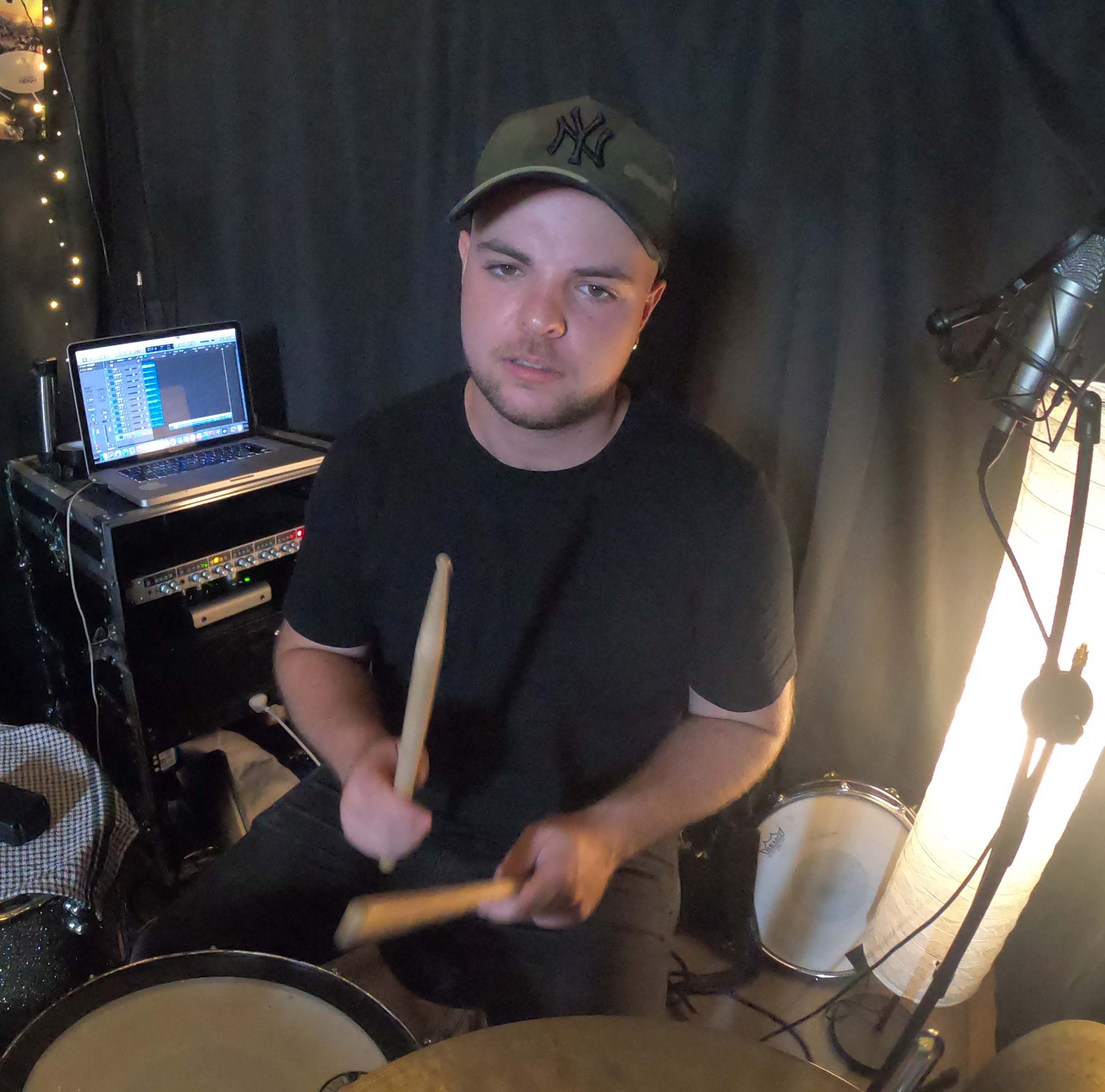
You don't want this look from your drummer...
The guitarists and keys players are playing the right notes and playing really forcefully as if to say “Play THIS”, but you can’t figure it out.
You’re not in the groove OR playing the right notes, so you’re making the singer’s job almost impossible and he is pissed. Instead of singing for the audience, he’s looking back at you, shooting daggers with his eyes.
He may not say it out loud, but he’s thinking:
“Aren’t you the bass player? Shouldn’t you be able to do this?!?”
Just one song ago, you were on top of the world, but now, as you limp and fumble through the rest of the song, a great knot of embarrassment rises in your stomach and you’re too ashamed to even look anyone in the eye.
It feels like an age has gone by when the song finally comes to an end, and all you want to do is hide. Someone on stage says,
“Let's get another bass player up here”
Totally embarrassed, you give the bass to someone else and slink away knowing that you won’t be asked to play again.
Everything was going so well up until that song, and now, you’re not even sure you can show your face at that jam session next week, or the following one.
You even consider never returning.
As you head home, you realize: you were the weakest link in the band. Everybody else was all over everything, and because you couldn’t follow along, you ruined it.
But what if things were different?
What if you never had to be embarrassed at a jam session again?
No more desperately bugging people to yell out the chords for you while they’re in the middle of playing.
No more scrambling for tabs or chord sheets to get through simple tunes.
No more B.S.-ing your way through a jam, only to have it blow up in your face.
No more going home feeling like a fraud, embarrassed and ashamed.
No more being the weakest link on the stage ever again.
What if you could “just play” ANY song at a jam session -
even if you’ve never heard it before?
Imagine going to a jam session and someone starts playing a song that you’ve never heard before.
Normally, if someone did this, you’d be filled with dread and you’d use any excuse to play something else.
You probably would have started hyperventilating at the very thought of playing a tune you don’t know.
But this time around, things are different.
Without warning, the guitarist starts playing, gives you a look and says, “Do you know it?”
You don’t!
But instead of squinting your eyes trying to copy the guitarist’s hands, hopelessly asking for the chords, or even opening up your phone to find a chord sheet or tab on Ultimate Guitar, you confidently say:
"That's fine - I'll just follow you"
You might not have played this particular song before, but you’re not worried. You’ll just turn on your ears and be fine.
The drummer launches into a fill - that’s your cue to start playing.
From the first note - BOOM!
You’re all over it.
You’re not worried about the chords and the key of the song. You can hear it all and play it all.
You find yourself locking in with the drummer and he’s all smiles. Damn - this feels GOOD!

This is the kind of face you want to see from your drummer
The guitarist gives you a grin and an approving nod as you anticipate chord changes and create an amazing bass line on the fly. It’s like you can look into the future and hear what’s coming next in the tune.
When you’re nice and settled in the song, you even find ways to throw in some of your more adventurous licks, and they work great - even though this is your first time playing this song.
After it finishes, everyone you played with has great big smiles across their faces.
The guitarist who started the song asks you, “Have you played that song before?”
“No - that was the first time.”
“Really?! No way!!! You could have fooled me! It sounds like you’ve been playing it for years!”
Instead of rushing you off-stage and replacing you with someone else, everyone wants YOU to play song after song.
So you do.
Some songs you know, and some songs you don’t. The audience can’t tell which ones are which though - they all sound and feel incredible.
The rest of the musicians trust you to handle anything they throw at you. After all, you can play anything!
After you get off stage and decide to call it a night, you head for the door. On your way though, you overhear some people talking about the music:
"That band was killing it tonight - that bassist was a MONSTER player"
All you can do is smile.
You go home that night, head held high and feeling proud of the music you made, and excited to come back and do it all again next week.
There were no weak links at that jam session - just musicians making great music.
So how can you play ANY song - even if you’ve never heard it before?
Right now, this might seem impossible to you - almost like a ‘superpower’.
How can you play a song that you’ve never heard before?
Do you need to have ‘perfect pitch’?
Do you need to be born with a magical ‘good’ ear?
Do you need more ‘talent’ than you have right now?
Do you need to just practice thousands and thousands of songs?
Do you need to sell your soul down at the crossroads?
Don’t worry - you don’t need ANY of these things (especially that last one…) to play songs after a single listen.
The secret is developing the skill that lets you:
- Play without needing to look up tabs, YouTube tutorials or pestering your friends to teach you songs.
- Sit in on jam sessions anxiety-free and confidently play just about anything
- Put on your favorite recordings and play the bass lines just by listening
That skill?
Playing By Ear
Playing by ear means that you have the ability to recreate something on your bass just by listening to it. No tabs, sheet music, video tutorials or bugging other musicians to teach you
When you can do it, it’s almost like magic.
But if playing by ear is so magical and lets you do so many really cool things, why don’t more people actually do it?
That’s easy.
They don’t believe it’s possible.
You might even think that yourself! If you do, I wouldn’t blame you. There is so much misinformation out there about playing by ear - it’s no wonder people think it’s not possible to do it.
Most of this doubt and disbelief comes from 2 really common myths about playing by ear
Myth 1: You either have a ‘good’ ear or you don’t

Some people just have 'good genes' to play by ear? And this is coming from a 'credible' source... Why even bother, right?
This myth is poison.
Why?
Well think about what would happen if you started to believe it for even a second.
If you thought that you ‘don’t have a good ear’ and the only people that do are the ones who are ‘born with it’, would you even TRY to learn to play by ear?
Of course not!
You’d give up before you’ve even tried!
All those songs that you can’t find tabs for - you’ll never play them.
All those jam sessions you could have been a part of - they’ll go on without you.
And the jam sessions that you ARE a part of won’t be any fun for you.
You’ll just be sitting there on the sidelines watching everyone else play, hoping for someone to tell you what notes to use so you can finally join in and make music with the rest of the musicians.
All because of a belief that you weren’t born with a ‘good’ ear - and it’s a belief that isn’t actually true!
FACT: A good ear isn’t something you’re ‘born with’ -
it’s something you learn
I don’t know about you, but I didn’t come out of the womb knowing how to play bass at all.
You weren’t born knowing how to hold your bass - you may have even felt super awkward when you first started playing, but you spent hours and hours practicing until it felt great to strap on your bass and play.
You weren’t born knowing the notes on the fretboard and which frets sounded good with which songs, but through lots of trial and error, lots of practice and lots of mistakes, you learned how to play the right notes at the right times.
You weren’t born knowing how to play with a drummer. It might have taken you a while to really find the groove and lock in, but the point is that you worked on it hard and got a little bit better every day.
Your ear is the same.
It’s totally fine if you don’t naturally have a ‘good’ ear. Your ear is something that you can work on, practice and perfect.
[Proof]
You can work on your technique until it’s flawless, you practice tricky songs until you nail them, you can drill scales until they’re second nature…The common thread isn’t ‘natural ability’ or ‘talent’.
It’s practice.
Playing by ear is a skill. It’s just that when you practice and work on this skill, you can comfortably sit in on jam sessions, learn songs without tabs or sheet music and hear the bass lines in the muddiest of recordings and play them yourself just by listening.
Myth 2: You need perfect pitch to play by ear
You may have heard of perfect pitch. It’s the ability to hear a note and be able to tell what it is. No reference, no nothing - you just know the pitch of everything around you.
If you played a note on your bass for someone with perfect pitch, they’d be able to tell you what note it was without looking. It even works if the sounds aren’t part of a song.
A car horn honks outside? “That’s a G.”
Your refrigerator hums quietly? “It’s a B-flat.”
The ‘ding-dong’ announcement at the train station? “A going down to F”
Pretty cool, right?! So if you could do that, surely, you’d be able to play by ear, right?
Not necessarily…
FACT: You DON'T need perfect pitch to play by ear (in fact, it's useless)
I don’t have perfect pitch, so I can’t tell you what it’s like, but even a lot of people WITH perfect pitch say that it’s not helpful when learning to play by ear.
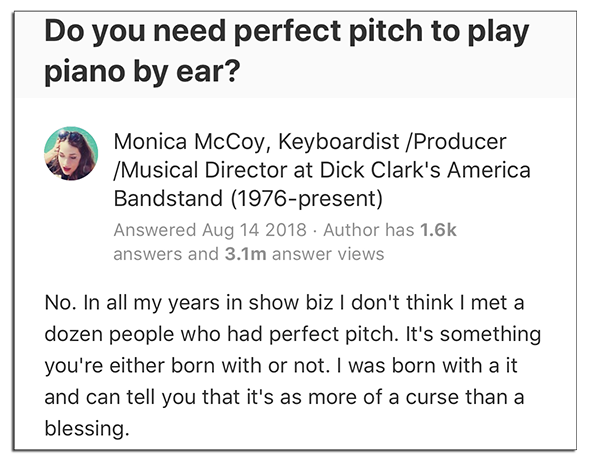
Perfect pitch might be an amusing parlour trick, but it’s functionally useless when it comes to learning how to play by ear.
Why?
Because it’s completely inflexible. If you had perfect pitch and you were learning a song for a jam session, you’d learn all the parts, all the riffs, all the licks, but what happens if you get to the jam session and the singer says, “Can we play it in a different key?”
Then all that time you spent learning this song has been wasted because you can’t actually use anything you’ve learned.
It’d be like you just used tabs or YouTube covers to learn the song and now you’re tied to that one way of playing it.
Like I said - it’s a cool trick, but not that helpful in the ‘real world’.
So if perfect pitch is useless for learning to play by ear, what should you be doing instead? Learning a very different skill:
Relative pitch.
This is the ability to recognize and recreate notes as they relate to each other.
For example, someone who has developed good relative pitch would be able to tell you all the notes in a bass line as they relate to one another. They might say something like,
“It’s root, root, root, then three more roots before going up to the minor 3rd, back to the root and ending on the 4th”
The specific notes aren’t mentioned at all - everything is related to everything else. By the way, this is a real bass line - Queen’s Another One Bites The Dust.
This skill is absolute GOLD for learning to play by ear. Why? Because it makes everything easier.
For example, if you learned a song using relative pitch, you could learn it in one key, and you automatically know it in every single key.
If you learn any song, you don’t need to worry if someone needs to change the key because the specific notes don’t matter nearly as much as the relationship between all the notes.
If someone asks you to jam on a song and you know relative pitch, all you need to do is open up your ears and you’ll be able to hear the entire chord progression and play it in any key.
If you can figure out the relationship between one note and the next, you can learn any song you like by ear.
No perfect pitch required at all.
Playing by ear changes EVERYTHING.
I’m not kidding. Everything.
Your ability to jam ‘on the fly, the way you recreate the bass lines you hear on the radio, TV, and Spotify, the way you learn songs, your reliance on tabs or tutorials…
It all changes when you know how to play by ear.
Imagine being able to play any song, with any band, in front of any crowd
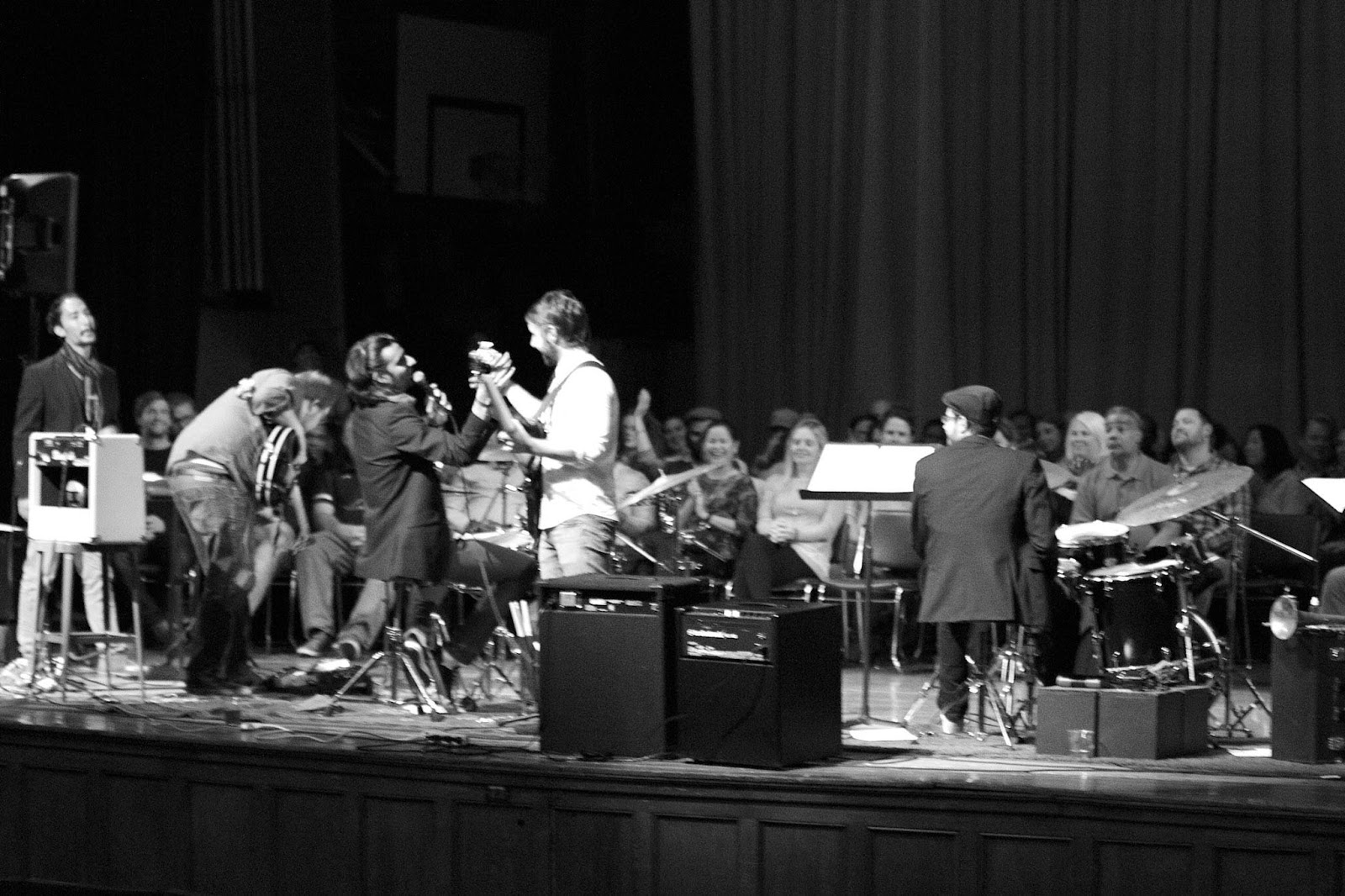
Playing by ear gives you a special kind of courage. You can sit in on jam sessions and play songs you’ve never heard before without worrying you’re going to ‘ruin’ it for everyone else.
If you hear something, you can simply grab your bass and play it without spending hours searching out tabs or tutorials and working through them.
Instead of feeling anxious, embarrassed or scared when you sit in at a jam session, it’s just another casual Thursday night. You’ll have an absolute blast and nail all of the songs instead of making mistakes, getting embarrassed and leaving early.
When your friends start playing a song, you won’t be left out, just standing there watching them play, wondering how to join in, feeling like you’re inferior to everyone else. You’ll be right there alongside them, making amazing music together.
You won’t have to get anyone to yell out the chords to you either. You’ll know exactly what to play and everyone is going to have a great time.
You can even become the kind of musician that OTHER people go to when they need help figuring out songs.
A friend needs help figuring out a chord progression? You can do that.
Your buddy is wondering what the notes to a certain bass line are? No problem - you can help out.
The guitarist at your church asks about the key of the song? You can answer confidently.
In short, you can be sure that you’re never going to be the ‘weak link’ in your band ever again.
If you get a call about a gig on a Monday and have to learn 50 songs by Friday, you can do it - no sweat.
Instead of spending days or even weeks trying to figure out simple bass lines, playing by ear allows you do it after a single listen. Sometimes, you can know the whole song before the song is even finished!
You won’t have to strain your ear to try and figure out what the bass is doing in a song. When you can play by ear, the strain and the frustration of hearing the bass on muddy recordings disappears.
Bass lines that were hard to hear become as clear as day.
Have to learn dozens and dozens of songs in a week? No worries.
Playing by ear is the skill that let me learn 50+ songs for a gig I was playing in LESS than 3 days - and I’ve done it multiple times for different gigs.
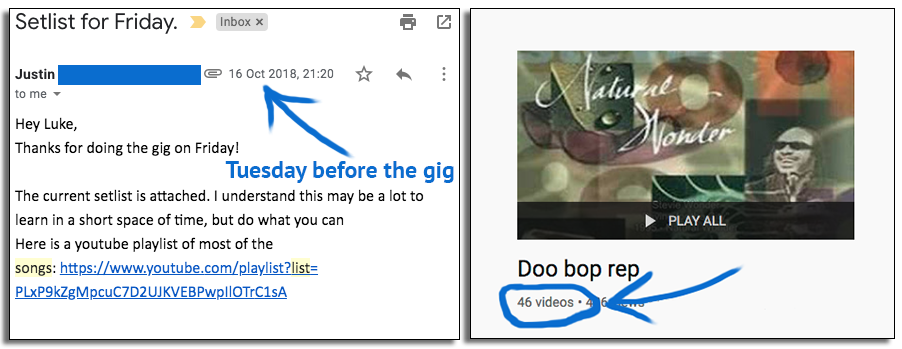
46 songs, sent on Tuesday night about a gig on Friday - and that wasn’t even all the songs...
If I didn’t know how to play by ear, there’s no way I would have been able to learn songs that fast at all.
But because I had worked on my ear, the gig went great!
No More Dodgy Tabs, Incomplete Tutorials Or Pestering Friends/Teachers
Playing by ear also means you'll never have to visit another tab site, watch another YouTube cover tutorial or pester your friends, bandmates, or teachers to show you how to play a song ever again.
It also means you can play the music you actually want to play - not just the music that you can find reliable tabs for.
Want to play obscure songs from your favorite band that nobody else knows? You can do that when you know how to play by ear.
If you want to play along with your favorite songs on the radio, CDs or Spotify, you can do that instantly when you can play by ear. No need to spend hours searching the web for tabs to learn them.
You’ll be able to play the music you hear “in your head” - and even create your own basslines
Most importantly though, when you know how to play by ear, you can finally start playing the music that you already hear in your head.
That means:
- Creating great bass lines
- Adding your own spin on existing lines; or even
- Getting your head around improvising on bass
In short, knowing how to play by ear gives you complete freedom to play just about anything that you want.
Any song, any lick, any fill you want to play - you can figure it out.
Any jam session you want to play at - not a problem.
Any new musician you want to play with or style you want to tackle - go for it.
The ‘Shortcuts’ That Actually Kill Your Ability To Play By Ear
I’m not going to lie - learning to play by ear takes hard work and practice. It’s so much easier to do anything else to try and learn songs and become a solid bass player.
Unfortunately these ‘shortcuts’ actually end up taking MORE time than if you learned how to do things by ear.
So what are these shortcuts, and why don’t they work?
Using Tab Sites - This is so much easier than trying to figure out a song by ear, right? Just look up the tabs and put your fingers where they tell you to put them, right? There are hundreds of sites giving out millions of tabs, and more get uploaded every day. It’s almost too easy!
But if there’s so many tab sites around giving out free tabs, what’s the catch?
Well firstly, the majority tabs are user-generated, and while they can be good, there are some horrifically inaccurate tabs out there. Check this out.
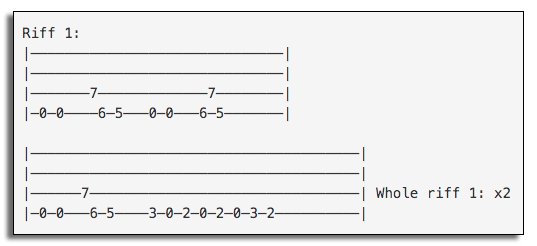
This is the first result on Google when you search for this song’s bass tab. You’d expect the first result to be pretty good, right?
Wrong!
This tab isn’t accurate AT ALL.
There are notes missing, notes added that shouldn’t be there and notes that are simply in the wrong order.
If you tried to play this with a band who knew what the bass line is supposed to sound like, they might politely tolerate you until the song was over, then never play with you again, or if you’re unlucky, they’d stop the song immediately and laugh you out of the room.
This is part of the problem with tabs; they’re often created by people who don’t have the most experience with figuring out songs on bass, so they give it their best guess, even if they know it might be wrong.
Check this tab out:
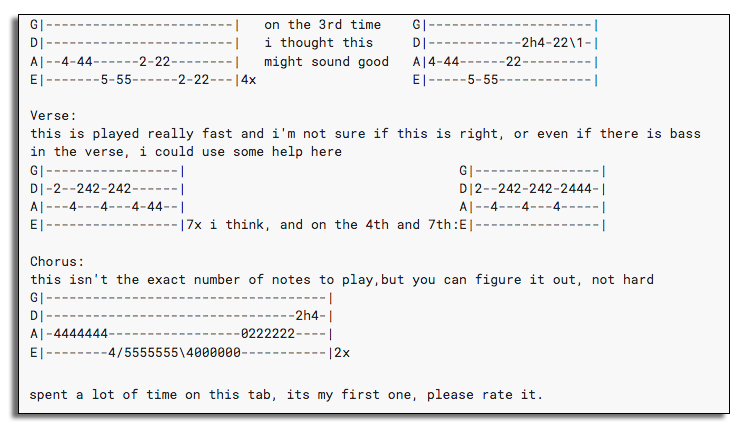
Again, it’s the first result when you search for this bass tab.
“I thought this might sound good...I’m not sure if this is right or even if there is bass...I could use some help here...This isn’t exact...It’s my first tab...”
Don’t get me wrong - I really appreciate the effort that goes into creating something like this. I don’t think if I would have been able to do any better on my own first tab, but this doesn’t exactly inspire confidence that the tab is even remotely accurate.
Plus, if you’re having trouble hearing the bass in the recording, the tabs might not help you much since you won’t know when you’re supposed to play each note or how the rhythm sounds. All you have are the notes (which, like I said, may not even be the right ones to begin with…)
And even then, there are endless debates in the comment sections of these tab sites about the ‘correct’ way to play something.
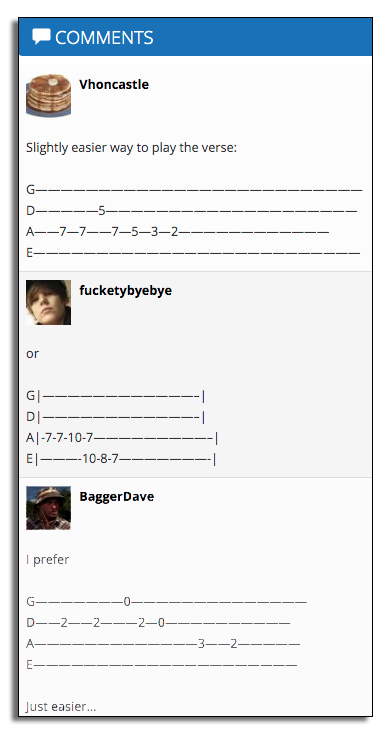
And what if no tabs even exist for a song you want to play?
This is the worst part. If there’s no tab for a song you want to play, you’re out of luck.
You’ll never be able to play that song at all - or at least until someone decides to come along and make a tab for that song.
Chances are though, if there isn’t already a tab for a song online, it’s probably a fairly obscure song. That means the chances of someone coming to your rescue, figuring out that song and putting that tab on Ultimate Guitar, Songster or RiffStation are slim.
No matter how much you might want to learn that song, you simply won’t be able to do it without learning it yourself by ear.
What about YouTube Tutorials?
Learning songs by checking out tutorials and covers of YouTube is definitely a better way of learning than by only looking at tabs.
You get to see how things are played as well as how they sound, plus you get the benefit of the louder bass than you might find in the original.
However, learning this way has problems too.
A lot of times, the people creating YouTube bass covers have just taken a tab that they found online and worked from that, so the same accuracy issues that plague the world of tabs also show up in song tutorial videos.
And while some videos are good for seeing the exact frets and strings that are being played, some of them can leave you frustrated.
People’s hands can cover up what they’re doing and sometimes you can’t tell what finger they’re actually pressing down since their hand is so close to the fretboard.
And once again, if you can’t find a tutorial or a cover of a song you want to play, then you’re out of luck again.
You either wait patiently until someone finally makes a cover of the song or you give up on that song entirely…
What About Asking Other Bass Players And Teachers To Teach You Songs?
This is a much better idea than using random tab sites or YouTube tutorials. If you have a solid teacher or a friend with more experience than you, they can be a great resource to help you learn songs.
But think about it. Are you going to get someone else to teach you every single song you’re ever going to want to learn?
Even the most patient of people can’t do that forever - myself included. I get emails every week from people asking me to give them tabs for a song they can’t find themselves.
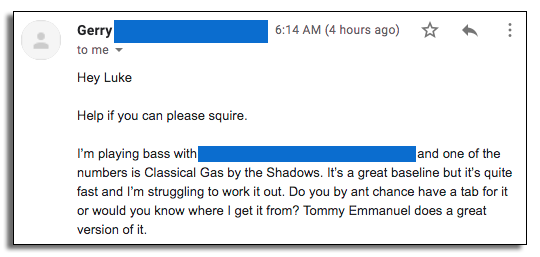

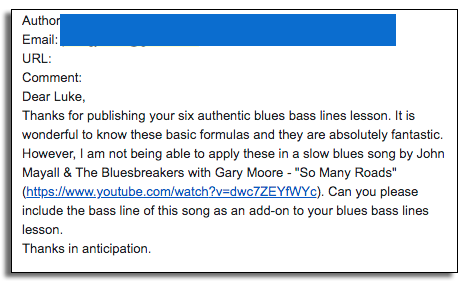
I get emails like these all the time
My response to these kinds of emails is usually the same. “Have you considered trying to learn them by ear?”
I’d rather teach you to fish (teach you to learn songs by ear) than just giving you the fish (telling you how to play the song).
(By the way, if I was giving people fish, I would totally give them bass.)

“Give a man the tabs and he will bass for a day. Teach a man to play by ear and he will bass for a lifetime” - Confucius (probably…)
Even if you do have someone with unending patience who will learn songs specifically so they can teach them to you, the better question is:
Do you want to rely on other people to learn your songs for the rest of your life?
Only using tab sites, YouTube covers or friends and teachers to learn songs means you’re always getting other people to do the hard work for you.
If knowing how to play by ear means freedom, then relying on other people to learn songs for you is the opposite - it’s a cage.
And if you never actually learn how to play by ear yourself, you’ll never escape that cage.
Just like a baby relying on its parents to feed and bathe it, you’d be relying on other people to figure out what to play and how to play it.
If you never learn how to grow up and figure these things out for yourself, you’ll never outgrow tabs, covers or other people teaching you.
You’ll never develop the skills you need to jam with other people, figure out bass lines for yourself, come up with your own original bass lines, or break free from the chains of using tabs.
My 15-Year Journey Of Learning To Play By Ear
Most people learn to play by ear through years of trial-and-error, experimentation and intuition.
In fact, this is exactly how I learned to play by ear.
My very first attempt at playing by ear was as a 7-year-old and it was a disaster. It took me months to figure out just over 3 bars worth of simple melody.
Being able to play by ear quickly didn’t seem like it would ever be an option for me.
Fast forward 9 years and I’d just been handed a bass and my guitarist buddy was teaching me the bass line to The Beatles’ Come Together.
Immediately, I fell in love with the bass. The way it sounded, the way it felt, the way it made my chest vibrate from the inside…
That first jam on that song was magical - it literally changed my life. I wouldn’t have been a bass player if it wasn’t for that moment in my life.
But there was a problem. I couldn’t play anything else on bass - just that one song that someone had taught me, and I didn’t have a teacher to guide me through learning any other songs.
Not long after though, the same friend who taught me my first song introduced me to the world of tab sites.
“I could learn how to play thousands of songs? And it was all free?!?!”

2005 Powertab Central was my saviour
I was sold! But I quickly ran into another problem.
I’d get excited to learn a song that I could play with my friends, so I’d rush to the family computer, suffer through dial-up internet speeds, find a site that had the bass tab I wanted, go to play it…
And it wouldn’t sound right.
In fact, some tabs, I’d play along with the song and it sounded downright horrible. I thought to myself, “Am I doing something wrong? Why does this sound so bad?”
Maybe it would be different when I played it with my buddies, right? So I would learn the song as best as I could using this tab I had found and go to play it with my friends.
But nope - still sounded bad.
I had fallen into the trap of accepting the tabs I found on the internet as gospel.
So I did the only thing I could think of - I tried tried to fix them.
I’d listen and see exactly which notes sounded right and which ones needed changing. I would try going up a fret from what it said on the tab, I’d try going down a fret. What about a different string? What if I took all the notes down a fret?
Trying to correct these dodgy internet tabs, I was accidentally training my ear, and over the next 3 years, I got pretty good at it.
I even started trying to figure out simple songs that I couldn’t find tabs for and even did OK with some of them as well.
It wasn’t until I was 19 or so that I saw what was possible with a really good ear.
What Does A World-Class Ear Looks Like?
I was struggling to figure out how to play a song called “That Thing You Do” - it was from a Tom Hanks movie.
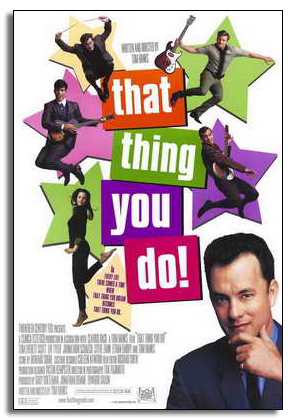
Don’t ask me why I was learning this song… I honestly can’t remember...
By that point, I had done a decent job of correcting tabs and learning simple songs, so I thought I was pretty good.
This song though, had a pretty complicated chord progression (at least, that’s what I thought at the time) and I just couldn’t figure it out.
I eventually got so frustrated that I called up a friend who was better at this stuff than I was and asked him for help. We sat down together and I asked him if he knew the song.
“No - just put it on. We’ll figure it out”
So I put the recording on and together, we listened. I was listening for what seemed like the thousandth time, and my friend, for the first time.
The beginning of the song was easy. I’d already figured it out, and my buddy - instrument in hand - quickly yelled out the same notes and chords that I had already deciphered.
The song edged it’s way to the second half of the verse, towards the first chord that I couldn’t figure out.
I thought my friend would stumble; that he’d get thrown off-balance by this sequence of chords that I just couldn’t make sense of.
I was wrong.
“C# minor...then F# major. Oh - then F# minor to A minor, then B.”
He didn’t even flinch. This sequence of chords that had plagued me for days, and he had just casually rattled them off as though it was the easiest thing in the world.
I must have had a shocked look on my face. My friend looked at me as if to say:
“Where’s the tricky part?”
He learned this song in a single listen…
This was the first time I had seen someone learn so quickly and I could barely believe what I was seeing.
Was this a prank? Had he secretly known this song all along? I couldn’t believe he could just learn this song so fast after I had spent days trying to figure it out.
With a dumbstruck look on my face, I asked him, “How did you do that?”
He simply replied, “Practice and ear training”
I asked him how and he told me how he did it, so I immediately started trying to do everything I could to learn to play by ear.
I asked friends and mentors questions, I read books, I got lessons with people who were way more advanced than I was.
Some advice and techniques were great and really helped. Others, not so much.
But slowly, bit-by-bit, I pieced it all together and eventually, I could do exactly what I wanted. I could learn songs in a single listen, sit in on any jam session and I completely terminated my reliance on tab sites, sheet music or YouTube covers.
The whole process though, took 3 more years.
I spent 9 years thinking that legitimately playing by ear was impossible.
3 more years slowly learning to correct dodgy tabs
3 extra years learning all I could about playing by ear.
If you add it all up, there was 15 years from the day I tried to figure out that first melody to the day where I could confidently jam with just about anyone, learn just about any song I wanted and play the music that was in my mind.
15 years!
15 years of using tabs as a crutch, of relying on other people, of being nervous if someone wanted me to play songs I hadn’t heard before…
What If It Didn’t Need To Take 15 Years To Learn To Play By Ear?
I made just about every mistake in the book when it came to learning how to play by ear.
I tried to learn songs that were too hard.
I relied on tab sites for WAY too long.
I tried to learn bass lines that were too difficult to hear for my level.
I’d try to jam with other more experienced musicians only to find myself stumbling through, playing all the wrong notes and feeling like a failure - like I shouldn’t even be playing with them in the first place.
I was an anchor weighing everyone else down for far too long.
But you don’t need to take 15 years to finally learn to play by ear. If you practice the right things in the right way, you can be well on your way in a matter of weeks.
I know because I took everything I learned over the course of 15 years about playing by ear and created a 6-week class and offered it to a small number of students.
These students were all from very different backgrounds, but they all shared similar challenges. They almost all:
- Overflowed with anxiety when they sat down at jam sessions
- Had trouble actually hearing the bass on recordings
- Wanted to ditch the tabs, sheet music and YouTube tutorials that they were using and learn how to do it for themselves
I was amazed at the kind of results these students got from going through this 6-week class.
Aielo J joined his very first cover band using the material he learned:
Early on when we started the class, we talked about our goals and I was wanting to join a cover band. So I was able to audition for one and get in! The fun part was using the first 3 weeks of our lessons to really knuckle down and really understand the music and not have to rely on the tabs and everything.
Aielo j.
Sara B - who had only ever learned from sheet music - learned her very first song by ear and even created her own chart for it from scratch:
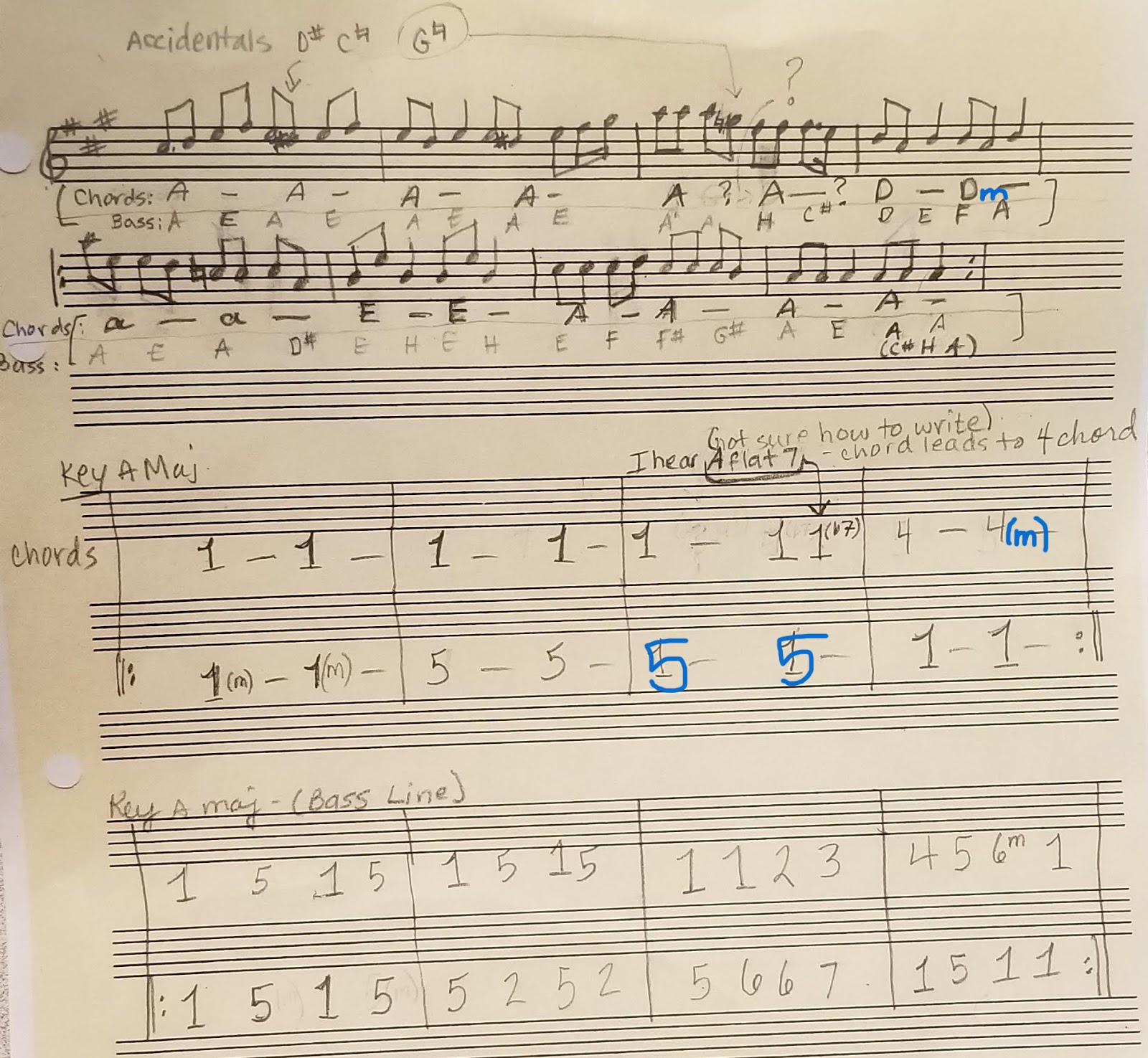
Sara’s very first ‘made-by-ear’ chart
Brian D can now learn songs in less than half the time it took him before:
Singing the major and minor exercises have been very beneficial to developing my ear- particularly in helping identify intervals as I transcribe tunes. Transcription time has shrunk for me by 75%.
Brian d.
Imagine being able to do this for yourself. How long does it take you to learn a single song? An hour? What if you could do it in just 15 minutes? Or even quicker?
And the best part of all this? It didn’t take these students 15 years to learn to play by ear like it did for me.
It didn’t take them 6 years or even 6 months to learn to play by ear.
They did it in just 6 weeks.
When you practice the right things in the right order and in the right way, you can learn to play by ear way quicker than you might think.
Even if you’ve never tried or don’t think you have a ‘good ear’.
Today, I’m super excited to share with you a brand new course:
IntroducingText
Sit in on any jam session, learn songs and bass lines in a single listen, and finally stop being the weakest link in the band
(while escaping the cage of tabs, notation and YouTube covers)
Even if you:
Level Up Your Ear is a six-week online course that guides you through the process of learning by ear step-by-step, starting at the very beginning.
You’ll learn exactly what works when it comes to playing by ear so you can finally play those song you can’t find tabs for, finally sit in on a jam session without sweating bullets and finally play the music in your mind.
Here’s How It Works
When you join Level Up Your Ear, you’ll be given access to a private members’ area where over six weeks, I’ll send you all the material to help upgrade your ability to play by ear.
Every week, we’ll tackle a crucial piece of the playing by ear puzzle and by the end of the course, you will have learned at least one song by ear in its entirety.
Not just the bass line, not just the chord progression - you’ll know every little detail of the song.
Chances are that you’ll learn a lot more than just that one song though. Just about all of the students who went through the beta version of Level Up Your Ear learned extra melodies, riffs, licks and entire songs.
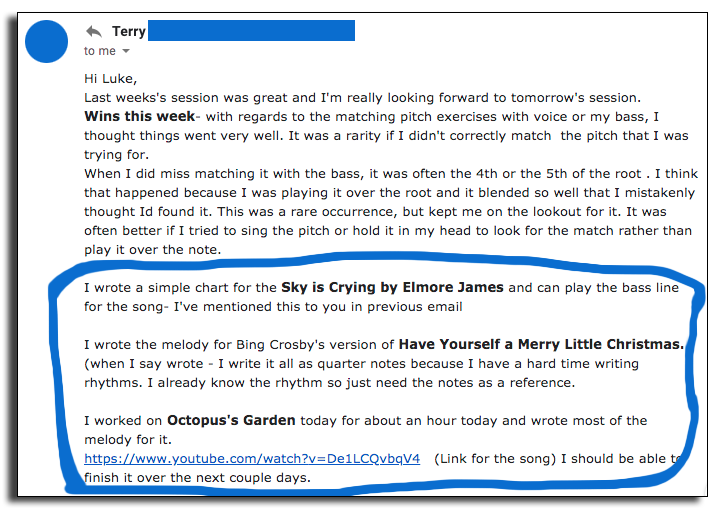
I didn’t ask them to do that - they did it all on their own. Once you get the playing by ear bug, it’s hard to stop learning songs by ear.
Most importantly though, you’ll know exactly how to keep improving and refining your ear to the point where jamming entirely new songs is not just a possibility - you’ll actually look forward to doing it.
Here’s the breakdown of what you’ll learn.

Module 1: The Superpower That Makes Playing By Ear Possible
Playing by ear is a skill, and in the first week of Level Up Your Ear, you’ll learn exactly how it’s not only possible, but inevitable when you practice the right things in the right way. In module 1, you’ll learn:
- The three playing by ear mistakes bass players make that lead to weeks or months of tear-your-hair-out frustration, and eventually push some bassists to quit
- Day one playing by ear exercises that gently awaken your ability to deeply internalize the music you want to play
- The exact tools you can use to jumpstart your ability to play by ear, even if you’ve never done it before or don’t believe you can
- [BONUS] How to ‘open up’ your ears using music you already know and love

Module 2: Hearing Intervals - Stop 'Pulling Teeth' Trying To Figure Out A Single Note
Nobody likes the torture of ‘Single-Note-Syndrome’, where you’re stuck on just one note and can’t figure out what comes next. The solution? Learning how to hear intervals, and that’s exactly what you’ll learn in module two of Level Up Your Ear:
- How to stop spending longer than a minute figuring out what comes next in a song or bass line. Just use my 3-step interval process to get ‘unstuck’ fast
- How to use ‘interval gravity’ to reliably figure out (Or master) any interval - even the unusual ‘hard-to-hear’ ones
- How to avoid ‘Single-Note-Syndrome’ where you agonize over every separate note for ages before moving on to the next one and repeating the whole excruciating process
- How to practice levelling up your ear in your ‘dead time’, like on your commute/washing dishes etc.
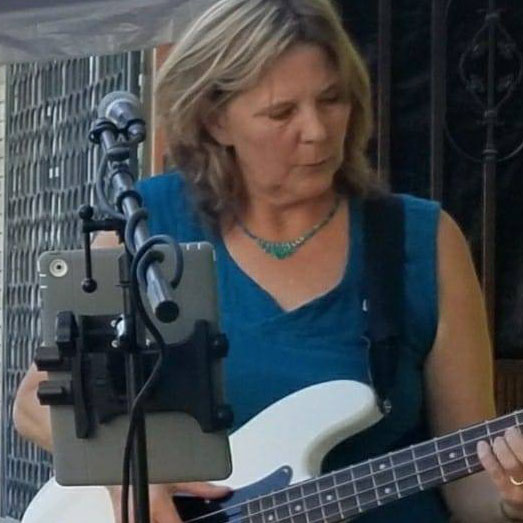
"
"Stuff that used to take me a whole day to figure out - you know, figure out 5 lines, now I’m doing it in half an hour because of Level Up Your Ear. That’s really helped me a lot. And it’s weird - I can’t tell you why it’s easier. It just is all of a sudden easier. I can hear it better."
Lauri K.
Level Up Your Ear Graduate

Module 3: Finding The Key - Stop Fumbling All Over Your Bass And Always Be 100% Confident In Your Note Choice
What if you could make really good guesses about the notes in your bass lines and be right more often than you were wrong? You can do that when you know the key and so much more. In module three, you’ll discover:
- How knowing the key lets you add your own ‘flavor’ to a song because you’ll know exactly what notes are going to sound good
- Use the key of the song to increase your chances of playing the right notes - first time - by 71%. Less options means less musical whack-a-mole and an easier way to learn songs and jam with your friends
- How to find the key of a song ‘on the fly’ - Master this and you’ll never struggle or need to search for notes at a jam session again
- The simplest piece of music theory to take the guesswork and anxiety out of playing by ear
- [BONUS] The two most common types of ‘modal’ songs, plus exactly how to approach them when you come across them in the wild
A guitarist friend of mine recently published a song of hers to iTunes/Spotify. Using the principles of LUYE I was able to quickly identify the key center and chord progression with just a few listens. I then “remixed” the song with a few improvised basslines of my own and sent them back! She thought they sounded really good and wants to re-record with one of the basslines I created!
Lloyd N.
Level Up Your Ear Graduate

Module 4: Deciphering Chords - Finally ‘Own’ The Music You’re Playing
Nothing kills the vibe of a great jam session than asking someone to shout chords out to you in the middle of a song so you can fumble around and find the ‘money’ notes. When you can play by ear, you’ll never have to do this again - you’ll simply be able to hear the chords as they’re played. Module four is all about:
- How to make figuring out bass lines 2x easier by learning how to hear the chords of a song
- The 2 most important chord types in music (Master these and you’ll be able to figure out 95% of the music you hear on the radio and jam sessions)
- Finally stop being a slave to the guitarist’s chord shapes and the keys player’s left hand: you’ll never have to ask what chords are being played again
- Learn how to hear the ‘harmonic rhythm’ of a song so you know when to change what you’re playing on your bass
- [BONUS] The 3 chord types that you’ll hardly ever see and how to easily identify them
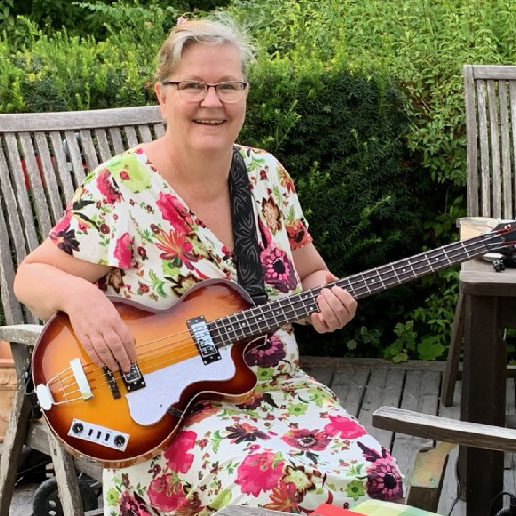
"
"I’m involved with a very small band…we were rehearsing Georgia On My Mind, and then I just started thinking, “Oh - what happens if I try this; if I do a 3rd or a 5th?” And I just started playing! I didn’t restrict myself, and sometimes it was like chords made in heaven…I felt like I was free…It was almost a religious experience. That was my first time improvising on an instrument - even though I had played clarinet for 15 years. I flew home"
Inga-Lill C.
Level Up Your Ear Graduate

Module 5: How To Learn Even The Trickiest Bass Lines By Ear: No Tabs, Sheet Music, YouTube Tutorials or Isolated Bass Tracks Needed
What if you never had to strain to hear the bass on a recording again? What if you could figure out any bass line, even if it’s buried behind a wall of guitars, masked by huge kick drums or hidden behind layers of reverb? It’s not a fantasy - it’s exactly what you’ll learn how to do in week 5 of Level Up Your Ear.
You’ll learn:
- The Hierarchy Of Hearing Bass: Why it’s so hard to hear bass lines on some recordings, and what you can do about it
- How to use the chordal method to figure out bass lines even if you can’t hear the bass in the recording
- The ‘reverse’ method of transcribing bass lines that lets you fill-in-the-blanks of tricky bass parts
- The ‘Divide And Conquer’ method that makes figuring out tricky bass lines far less intimidating
- [BONUS] Use software to make it simple to figure out the intricacies of hard-to-hear bass lines
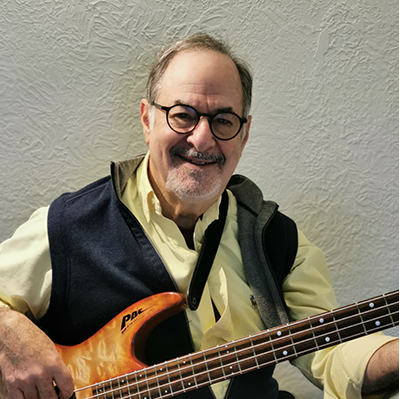
"
"Learning bass lines by ear is lots easier...I’ve built up a backlog of bass lines and I’m better at hearing what’s going on. LUYE definitely helped me to sort those out - to figure out what those were."
Chuck L.
Level Up Your Ear Graduate

Module 6: Your Personal Playing By Ear System
Everyone learns to play by ear in different ways - there is no ‘one-size-fits-all’. That’s why in the final module of Level Up Your Ear, you’ll be building and perfecting your own system for playing by ear.
Use it to sit in on any jam session you like or simply learn the songs that you want to learn - not just the songs you can find tabs for.
- How to develop your own ear training blueprint to make learning songs by ear faster and easier than you ever thought possible
- The secret to playing songs by ear ‘on-the-fly’ at jam sessions or playing along with your favorite recordings - no tabs or YouTube covers needed
- How to use your ‘levelled up’ ear to sit in on jam sessions with ease - no more embarrassing yourself fumbling around looking for the right note.
- The 2 foundational elements that every playing by ear system MUST have - without these, you’ll just be playing musical whack-a-mole
- The ‘structure’ that most songs use that makes it easy to predict exactly what’s coming next. Master this and it’ll seem like you’ve been playing songs for years that you’ve never heard before.
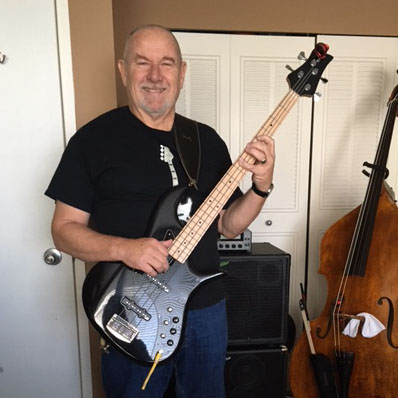
"
"I came in with very little expectations because I haven’t been able to hear. People have tried to teach me, so my expectations were low...What was most surprising is that you gave me a whole system to follow and it was a logical system that worked. I didn’t expect a system that has so many possibilities in it. I would say this has been the best online course I’ve done by far - nothing comes close."
Alastair K.
Level Up Your Ear Graduate
[BONUS] 15 Hours Of Playing By Ear Masterclasses
Even with the step-by-step method inside Level Up Your Ear, it’s still possible that you’ll have some questions about how YOU can play by ear.
Luckily, after teaching 674 students the process, I’ve come up against just about every possible question about playing by ear on bass.
And you get those answers to those questions in the form of the LUYE Masterclasses. These are recordings of previous LUYE cohorts where we all got together and worked through the common playing by ear struggles - live.
All up, you get 15 HOURS of ultra-specific Q&A around playing by ear on bass. Practically every question about developing a single listen ear is covered.
Things like:
- “What song/s should I start with learning by ear?”
- “How does knowing intervals help with recognizing chord progressions?”
- “Are there exercises to help hear bass lines that are ‘buried’ in a song?”
- “How can you distinguish between major and minor intervals by ear?”
- “Is it possible to start recognizing chord progressions on ‘auto-pilot’?”
- “What do you do if the song doesn’t fit into a major OR minor key?”
Plus tons of song breakdowns where we go and learn a song by ear - on the spot - so you can see how you can use the things you’re learning in the real world.
As a Level Up Your Ear Student, you get full access to the recordings of these masterclasses to help you overcome just about any playing-by-ear barrier.
I play with a keys player who sent me a track of a jazz version of Garth Brooks’ “We Shall Be Free” and I laid down a bass track to that this morning...all by ear. It was AMAZING
chuck l.
I find your approach to ear training so refreshing and I have never seen anyone with your ability to break listening down in such helpful steps. So a big thank you to you, Luke. I sure find our weekly sessions with you very helpful and encouraging. They really do help to demystify what seems to me as pretty mysterious!
Alastair K.
...after doing all this ear training with you guys, the song “Norwegian Wood” came into my head, and [I thought] that song’s gotta start on the 5th. So I grabbed my bass and I played the melody and the whole thing resolved exactly to the tonic. So I was really really encouraged about that. It was almost like - it gave me chills. Like WOW - I finally got it!
Tony M.
[BONUS] Your Playing By Ear Superpower Workshop
One of THE single best ways to start playing by ear is to use your voice, but SO many bassists simply aren’t comfortable doing it. The common refrain is:
“But I’m not a singer…”
Now I’m no singer either - but you also don’t have to be a great singer to play by ear.
But because using your voice is SUCH an important part of playing by ear, I hired a vocal coach named Vanessa who specifically teaches people who ‘can’t sing’ and gets them comfortable using their voice.

Your guest teacher who can show you how to use your voice, even if you aren't a singer (and don't plan to be one...)
Normally she charges hundreds of dollars to work with her, but because you’re a Level Up Your Ear student, you’re going to get her workshop 100% free.
In this special pre-recorded workshop, you’ll learn:
- Specific exercises that will get you comfortable, confident and competent with your playing-by-ear superpower
- Why some bassists lose the ‘mental game’ before they’ve even begun - of playing by ear and what you can do to ‘win’
- How to use your voice to play by ear, even if you’re not a singer (or even hate or are embarrassed at the sound of your voice)
Once you can get comfortable using your voice using Vanessa’s methods, playing by ear gets SO much easier for you.
If you’re ready to start jamming effortlessly with people ‘on-the-fly’, learning and playing your favorite bass lines just by listening to them, then I Vanessa can help you 'unlock' your playing by ear superpower.
I used to look forward to those masterclasses every week...I’d come off those lessons and just be high as a kite because it was like, “Wow! Look at this - you’re making this understandable!
Alastair K.
Frequently Asked Questions
"6 weeks to play by ear? That's impossible!"
Let me be clear - If you’re a beginner right now and haven’t really worked on your ear yet, you won’t be playing absolutely everything by ear in just 6 weeks.
The process of genuinely developing your ear takes months or years, not days or weeks and anyone who promises you that they can help you play by ear in weeks probably isn’t being honest with you. It’s just not realistic.
It would be like promising a scrawny guy that he can get as huge as Arnold Schwarzenegger in 6 weeks. It’s just not going to happen - there are no ‘magic pills’ when it comes to your ear.
Your ear is like a muscle that needs to be worked on; a skill that you need to practice. Over time, if you do the right things and put the work in, your ear gets stronger and stronger and eventually, you have the freedom of being able to play just about anything by ear.
Like I said though, that process takes months, not days or weeks.
That being said, all the material will be delivered over just 6 weeks. Then you can take the ideas, techniques and strategies for playing by ear and practice them until they’re second nature to you. You’ll have lifetime access to the material, so you can constantly review your ear and make continuous improvements.
Without any real guidance, it took me about 15 years to learn to play by ear. 15 years of correcting inaccurate tabs, 15 years of getting anxious at jam sessions and 15 years of not playing songs I loved because I couldn’t find tabs and couldn’t learn them by ear.
I’ve made sure that it won’t take you 15 years though - I’ve put everything I learned about playing by ear into this course and made everything step-by-step. Just follow the process laid out in the course, do the work, practice the exercises and soon you’ll be confident enough to play at jam sessions and play songs you've never even heard before, like a previous LUYE student, Jason:
I've been able to achieve something that's long been an ambition: to join a jam session and just start playing the song, even if it's one I haven't heard before. I used to just grind to a halt in frustration. Now I'm getting compliments on not just keeping up, but for creating interesting baselines on the fly. It's still a journey--not able to magically play everything just yet--but it's a path forward where there used to be a roadblock.
Jason R.
"How much time will I need to dedicate to the course?"
Level Up Your Ear is NOT the kind of course where you just sit back and passively watch videos. If you commit to the course, I want you to actually do all the exercises I’ll be showing you.
I recommend setting aside at least 30 minutes per day, five days per week if you really want to see some results with your ear.
If you can do more, then that’s great! You’ll likely see stronger results in less time, but 30 minutes a day is a great starting point.
The best part of the course though, is that I’ll show you how you can actually level up your ear in your ‘dead time’ - like while you’re driving to work, washing dishes or even in the shower.
You can develop a monster ear without needing to change your schedule at all.
Lifetime Access - You’ll also have lifetime access to all the material in the course, plus all future updates, so even if you get sidetracked or can’t put in 30 minutes a day, that’s totally fine.
Absolutely everything in the course will be ready for you whenever you are.
"Will this work for the kind of music I play?"
Absolutely. No matter what style of music you play, the principles of playing by ear don’t change. You can play rock, gospel, jazz, country, klezmer, metal, salsa or folk music and use the same techniques to learn all of these styles play by ear.
In fact, developing your ear is a fantastic way to learn new styles of music. Instead of searching out teachers, tabs, or YouTube covers, you can simply open your ears and play exactly what you hear.
Of course, a 3-chord folk song is probably going to be less challenging than a modern gospel song, but you can still learn them by ear in the same way.
In the beta class of Level Up Your Ear, one student, Sara B, an upright bass player, wanted to learn how to play at jam sessions for traditional Transylvanian folk music. You can’t get much more niche than that, and through the class, Sara thrived!
She learned her very first song by ear, learned how to figure out the key just by listening (something she couldn’t do before) and learned how to identify intervals so she can play bass lines by ear.
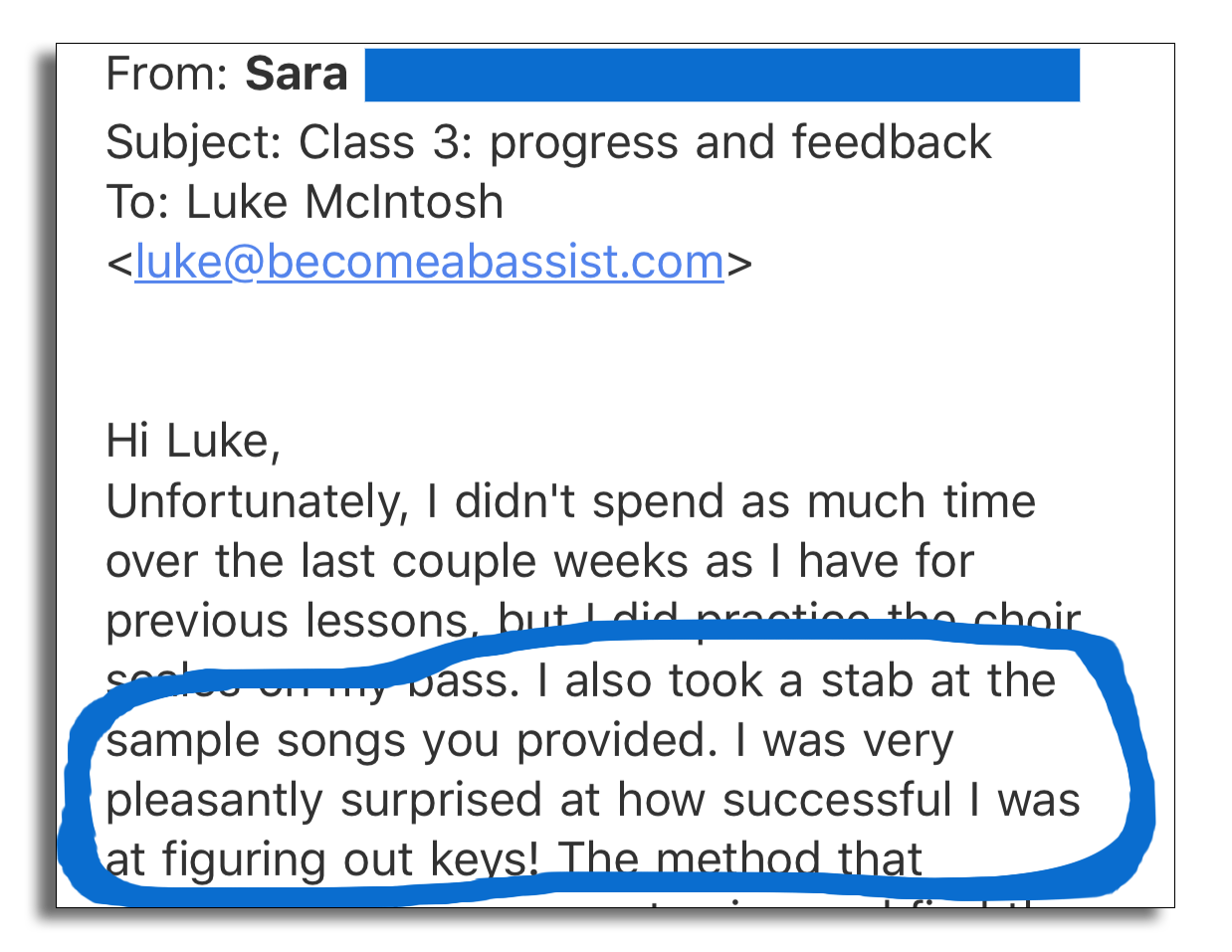
If Sara can do that with Transylvanian music, then you can do it for your style of music.
"I'm tone deaf. Will I get anything out of this course?"
Let me dispel another myth. There are a small number of people (from 2.5 - 4% of the population) who suffer from an actual medical condition called amusia which is essentially the medical term for tone deafness.
Sufferers of amusia perceive music as just being noise, and most of the time, they don’t enjoy it at all.
You’re here reading this page, so I’m guessing that you DO enjoy music. You enjoyed it enough to listen to it, then got inspired enough to pick up a bass and try and make some for yourself, and now you're nearly 9,000 words deep in this page. If I had to guess - if you got this far, then you don’t actually suffer from tone deafness.
What you may be suffering from is an over-reliance on tabs, YouTube covers or other people to learn your songs for you. It could just be that you’ve never given yourself a real opportunity to upgrade your ear. Have you ever really tried learning by ear? Or have you automatically put it into the ‘too hard’ basket?
You may be suffering from someone in your past telling you that you’re tone deaf, and for some reason, you believed it without questioning. Maybe a bully, a friend, teacher or even a parent heard you singing once and told you that you must be tone deaf - and you believed them.
This kind of thing breaks my heart and directly feeds the first myth about playing by ear; that you either have a ‘good’ ear, or you don’t.
It’s simply not true.
As I’ve already said, learning to play by ear is a skill, and one that can be learned, practiced and eventually perfected, even if you think you’re tone deaf - because if you enjoy music, you’re not tone deaf at all.
"Will this course teach me perfect pitch?"
No - that’s not what this course is about at all. Perfect pitch might be a cool trick, but it’s not helpful at all when it comes to real-world situations, like a jam session.
Instead, Level Up Your Ear is about developing relative pitch; the ability to hear everything as a whole. This means you can see the ‘big picture’ of songs.
Instead of focusing on the notes that are happening right now, you’ll learn how to hear the entire key and chord progressions and be able to predict what’s coming next. That means you’ll be able to create incredible bass lines on the fly and know that you’re playing the right notes.
With perfect pitch, you might be able to tell what notes are happening right now, but with relative pitch, you’ll know what came before, what’s happening right now, and what’s likely to happen 4, 8, or 16 bars from now.
If perfect pitch is what you’re after, you won’t learn it in this course.
"Do I need to know music theory to join?"
No - you don’t need any existing music theory knowledge. The few music theory concepts that I do cover in the course are explained in full.
You don’t need a music theory degree to play by ear. Some of the greatest musicians in history are the ones who played by ear and they didn’t know the first thing about music theory.
That means that music theory knowledge is optional when it comes to playing by ear.
Knowing a few key pieces of music theory can help when it comes to playing by ear, but like I said, those are fully explained inside Level Up Your Ear.
“Is this a ‘live’ course? Do I have to show up at a specific time?”
Not at all!
All of the content of Level Up Your Ear is ready and waiting for you in a private members’ area where you can watch all the videos, go through the exercises and download all the cheat sheets, PDFs, audio exercises and everything else.
You can go through it 100% at your own pace - including the 15 hours of recorded Q&A sessions.
The entire course is completely ‘on-demand’, so you can fit it around your life.
"Do I have to be a good singer to go through this course?"
You don’t have to be a great singer to learn to play by ear. You don’t even have to be a good singer.
That being said, I will be asking you to use your voice in the course. Using your voice is probably the single best way to learn how to hear and play melodies, chord progressions bass lines - just about everything.
And I can’t emphasize it enough - you DON’T have to be a good singer to get the most out of this course. You don’t have to be as smooth as Sinatra or as flashy as Beyoncé - all you need is a willingness to try.
If you’re unwilling to even try using your voice though, then this course is not a good fit for you and I wouldn’t recommend that you join.
If you are willing to try though, have a look at what you can accomplish:
Before LUYE
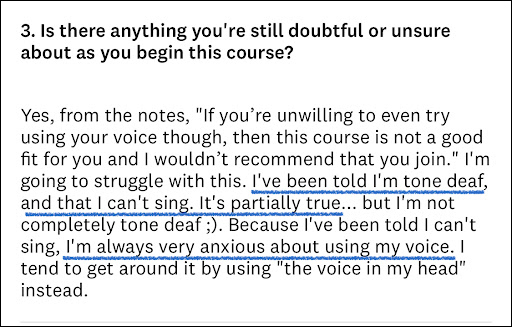
From a student’s LUYE ‘intake’ survey
This student, Sarah D, had been told that she was tone-deaf and that she ‘couldn’t sing’ (presumably by friends, family, or even a mean-spirited music teacher…) and had serious anxiety about using her voice. But look at the email she sent me the first day she started going through the material in Level Up Your Ear.
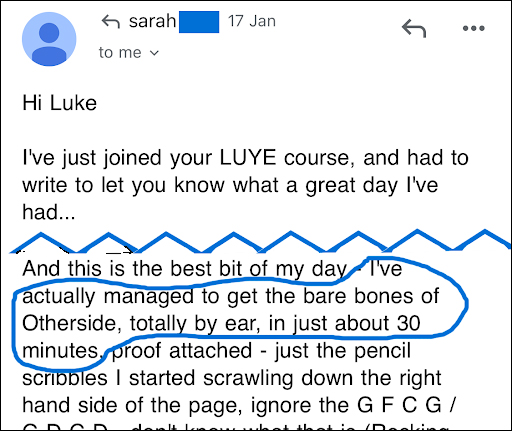
Sarah learned her first song by ear in 30 minutes
And not only did she tell me that she’d learned her first song, she showed me proof:
If Sarah, who had such anxieties about her voice, can do it, then I believe you can as well. Sarah definitely wouldn’t consider herself a great singer, but like I said, you don’t have to be a great singer to learn to play bass by ear.
"I already have a pretty good ear - will this help?"
If you:
- Can listen to songs and pretty quickly figure out the key and chords
- Can sit in on jam sessions playing songs you’ve heard before and hold your own
- Can hear the bass on recordings, even if the bass is buried in the mix
- Already have a playing by ear system that lets you learn songs in a single listen (or at least very few listens)
Then this course isn’t for you - you probably won’t get much out of it that you don’t already know.
However, if you struggle with these things or just don’t have a clue about playing by ear, then Level Up Your Ear can help. You’ll get the tools and tricks to start developing the kind of ear that lets you hear a song once and know how to play it.
You can try out Level Up Your Ear for 60 Days Risk Free
The goal of Level Up Your Ear is very simple. By the end of the course, you will have either learned your first song completely by ear, or if you’ve already learned songs by ear, you’ll have a system and process that lets you do it faster, and makes everything easier.
After the six weeks of the course, you’ll be equipped with all the tools and techniques you can practice to develop your ear to the point where you can confidently sit in on any jam session, recreate the bass lines from your favorite recordings without needing tabs, and play the music you hear in your head.
60 Day Money Back Guarantee
I want to give you the best possible chance of learning how to do all these things and that’s why Level Up Your Ear comes with a rock solid 60-day money back guarantee.
Here’s how it works:
Try out the course risk-free for 60 days. Watch the videos, download the PDFs, do the exercises with the practice tracks, try out all the different techniques for learning to play by ear… 60 days covers the entire length of the course, so there’s more than enough time to really sink your teeth into the material and start developing your very own monster ear.
If you don’t like the course for any reason, just email me within 60 days of joining and I’ll refund every cent. I believe in the course I’ve created and I want to make sure there’s absolutely no risk for you to join.
All prices in USD
Never Feel Like The ‘Weak Link’ Among Other Musicians Again
Where do you want to be 6 weeks from now?
Do you want to feel anxious every time you sit down to play unfamiliar songs with other people?
Do you want to feel inferior and inadequate - like you’re the weak link whenever you’re playing with these more experienced musicians?
Do you want to be the person who needs someone to yell notes at you in the middle of a song so you can fumble your way through it?
Do you want to be the kind of musician who makes everyone stop playing while you ask for the chords so you can join in?
Do you want to be that bass player who gets replaced after a single song because you just can’t keep up?
I know you don’t want that.
In 6 weeks, you could be like Brian, who can learn songs and bass lines in a quarter of the time it took him before:
Singing the major and minor exercises have been very beneficial to developing my ear- particularly in helping identify intervals as I transcribe tunes. Transcription time has shrunk for me by 75%.
Brian D.
In 6 weeks, you could be like Victor who’s finally getting compliments on his bass lines:
A big win for me is a song that my wife requested [my band and I play] "Grace Wins" by Matthew West… To make a long story short, my wife loved how we did the song, and I got several unsolicited compliments on my bass line--and I rarely get those! My ear has opened up not only in terms of pitch, but also in discerning tone and balance
victor o.
In 6 weeks, you could be like Sara who’s now feeling free from the written notes and theory:
[Level Up Your Ear] has oriented me toward some of the key elements I need to focus on to help me become unbound from written notes. I can now zero in on those key things without having to wade through all the weeds of music theory.
sara b.
In just 6 weeks, you could sit in on that same jam session, confident that you can play ANY song the band throws at you.
Or, when someone starts playing a song you’ve never heard, you’ll know how to quickly and easily figure out the perfect bass line for the tune. The kind of bass line that says, “I know this song - I’ve been playing it for years” even though it’s brand new to you…
In 6 weeks, you could you finally feel like you’re pulling your weight instead of feeling like you’re dragging everyone else down.
You could become ‘irreplaceable’; the bass player that everyone loves playing with because ‘you can play anything’.
If you want to finally be able to jam with people ‘on the fly’, play your favorite bass lines just by listening to them and ditch the tabs and YouTube covers once and for all, I can help you inside Level Up Your Ear.
Enrollments for the course are closing this Friday night at 11:59PM EST, so if you’re ready to learn how to play by ear, make sure you get in before the deadline.
I’m excited to see you in the course - let’s do it!
Cheers,
Luke
All prices in USD
Still On The Fence? Have A Look At What Other LUYE Students Say About The Course
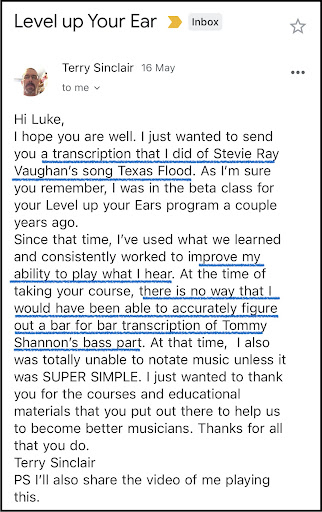
And have a look at the video Terry is talking about:
I feel that I learned more from this than from taking ear training lessons from a trained vocalist/pianist over the course of 4 months.
lloyd n.
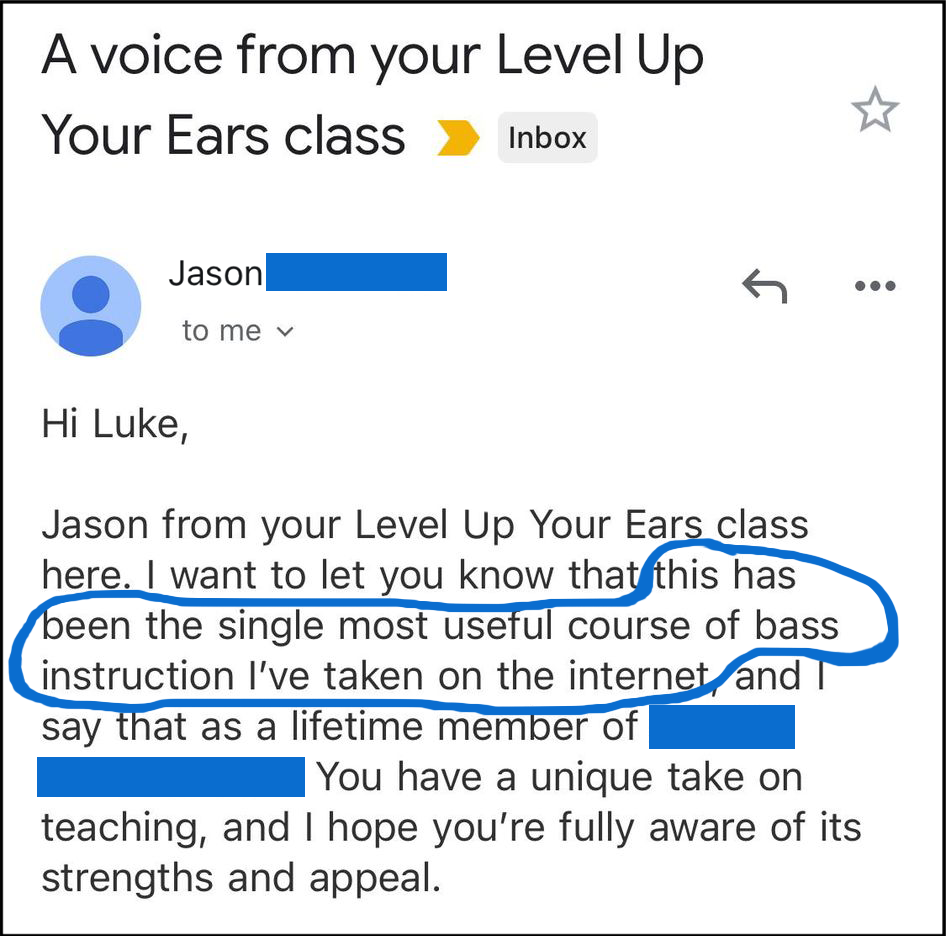

And check out Robert’s very first 100% by ear chart:
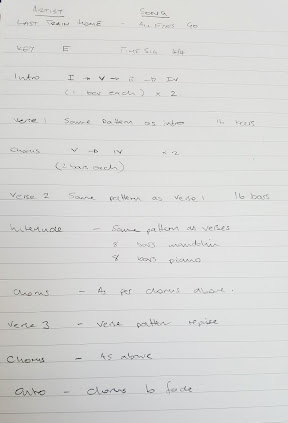
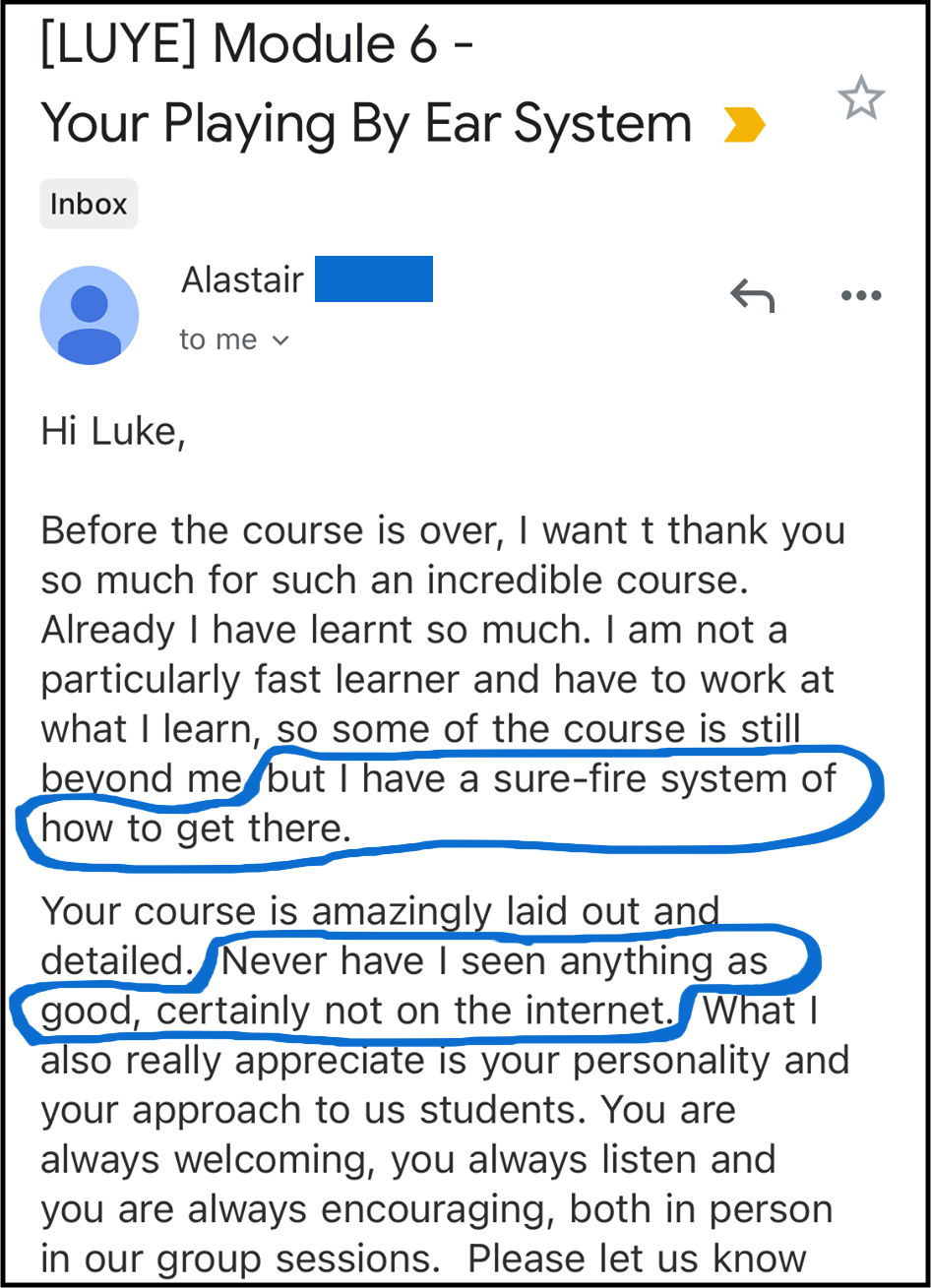
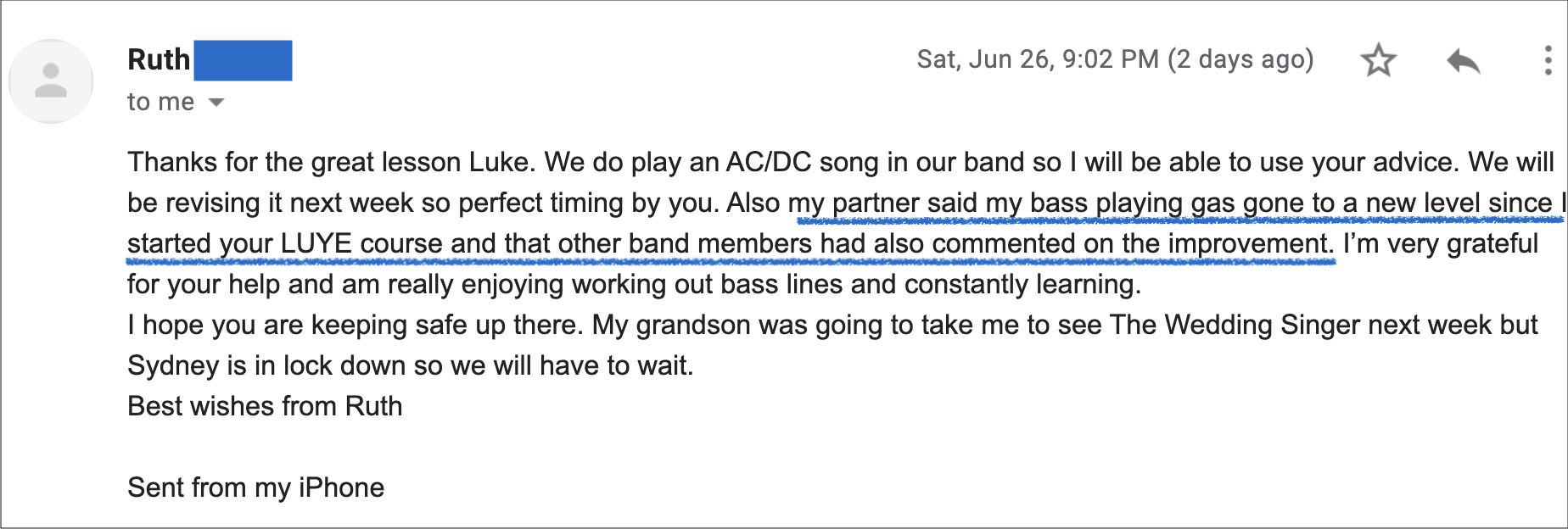
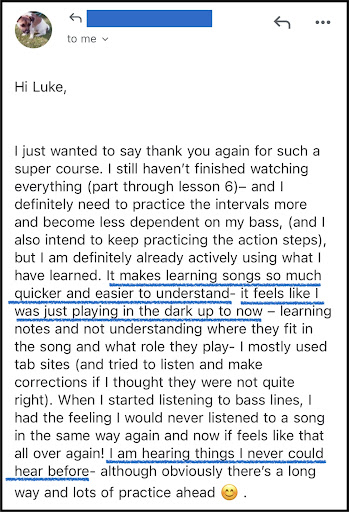
Oh, BTW, you are a really fabulous teacher. The play-by-ear is changing my entire approach to playing. I now have the confidence to play without music.
vicky k.
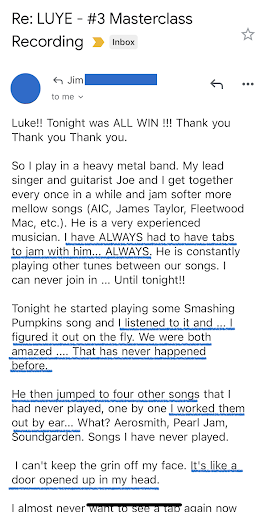
All I can say is somehow, doing just a little bit of your active listening seems to have flipped some switch in my head and I'm hearing music in a very different, wonderful way. Hell, even if I never get any better playing my bass, with this development I've already got my money's worth from your course. Really, I'm sure this change will affect my bass playing, but beyond that, it has dramatically improved the quality of my life. It is amazing! Thank you.
Joshua C.
Level Up Your Ear Graduate
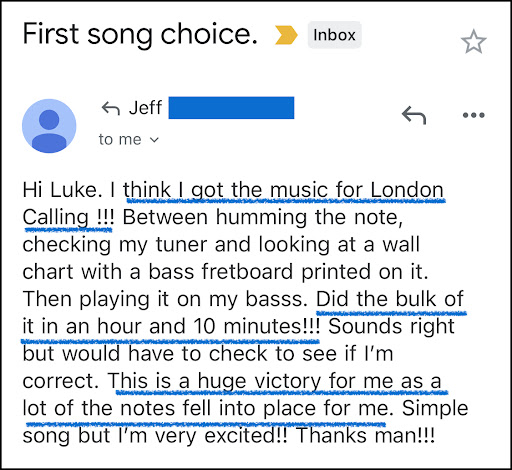
All prices in USD
